Playwright Edouard Elvis Bvouma on Cameroonian Theatre / Le dramaturge Edouard Elvis Bvouma discute du théâtre au Cameroun
For the 2018 PEN World Voices Festival, the Martin E. Segal Theatre Center brought Cameroonian theatre artist and writer Edouard Elvis Bvouma to New York for a reading of his first play to be translated into English: A la guerre comme à la Gameboy (In War as in Games).
The play, which I translated, is told from the perspective of a child soldier who wakes to find himself alone in a battle camp after the war has ended. He tells his story to the only other living being remaining: a terrified young girl. (Bvouma wrote a second play from her perspective, La poupée barbue (The Bearded Doll), which won the 2017 RadioFrance International Prize for Theatre.)
Following the Segal Center reading, there was a brief discussion between Bvouma and the audience, which I moderated. I took advantage of a break that afternoon to further discuss Bvouma’s work with him.
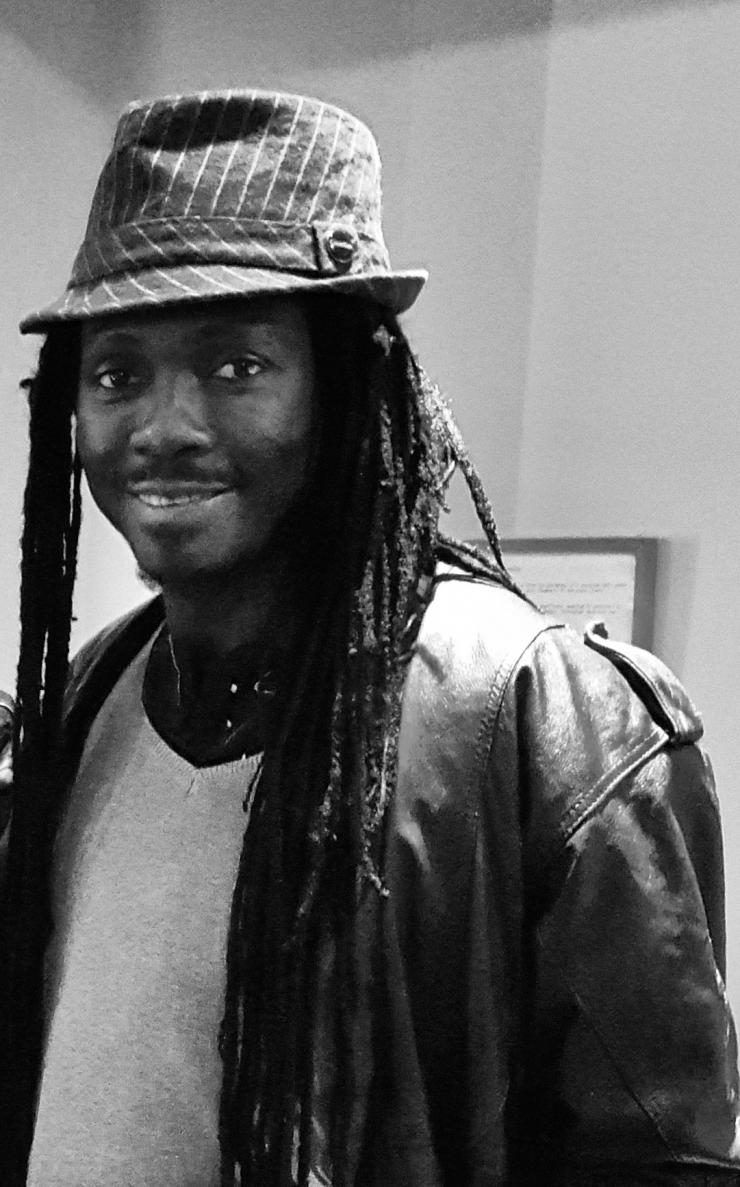
Heather Denyer: When I was in Cameroon as a Peace Corps Volunteer between 2003 and 2005, I knew of no theatre. It seems that the country’s artistic output hasn’t measured up to that of neighboring countries. How did your life push you towards professional theatre?
Edouard Elvis Bvouma: [Writing] was a childhood dream of mine. I remember when I was still in elementary school, not far from the school there was a bookstore with books in the window display, and I often enjoyed lingering there. Every time I passed by, I would stop. It made me happy just to look at the book covers.
Later on I joined a theatre troupe; they needed an actor. I became a regular performer in the shows. I got a taste for [it], and that’s how I stayed [in theatre]. Afterwards, I continued to write short sketches, short stories... I think that is why, in my writing today, I always have humorous bits.
Heather: What is theatre like in Cameroon today?
Edouard: I can frankly say that I was lucky, and that my luck comes from being part of a generation that’s pushing a renaissance, a new life in theatre. But there aren’t any festivals anymore. There aren’t any more performance spaces. There was also the problem that, for a while, all the theatremakers—the actors, the directors, etc.—left to live outside of Cameroon. So that generation was struggling a bit…
I like the expression Congolese playwright Dieudonné Niangouna uses: “The theatrical resistance.” It’s what we’re trying to do in Cameroonian theatre. There was a belle époque for theatre, then there was a drop, and now it’s growing again. Even if the institutions don’t exist, for the participants, there’s a renaissance that’s taking place.
Heather: Then you have a lot of hope for the future.
Edouard: Yes! I have a lot of hope.
Heather: There are now artists like yourself who stay in Cameroon. Does that mean there’s more public interest in theatre, too? Have more theatre companies formed recently?
Edouard: Yes, there are companies that have formed and that try to function within their limited means as best they can. But there aren’t that many of them. There are companies that exist in name, but companies that regularly present work? There aren’t even ten in Cameroon.
People leave or they stop working in theatre. For example, there’s a dire lack of actresses right now: they get married and then it’s over.
There was a belle époque for theatre, then there was a drop, and now it’s growing again. Even if the institutions don’t exist, for the participants, there’s a renaissance that’s taking place.
Heather: That’s true everywhere in West and Central Africa, as I’ve come to recognize in my research on theatre in the region. When women get married, and above all when they have children, their theatre careers are over.
Edouard: There you go. There are also people who leave to work in other entertainment forms, because theatre doesn’t pay very well. People go into film, they do stand-up comedy. But there are small groups who try to make theatre. This is what I try to do, too. I continue, despite everything, to make theatre here. I work with my group [Zouria Théâtre]. I try to create new initiatives. I try to write things that directly concern my audiences.
Heather: Do you mean Cameroonian audiences or audiences more generally speaking?
Edouard: I’m more interested in a theatre that speaks to everyone, [but] from the starting point of my own realities. Because to speak to everyone… [It’s] a little like Tolstoy put it: If you describe a village, you will be universal.
So, I’m more interested in [work] that says something about me, but that can also speak to everyone.
[There can be a lack of public interest in new plays, but] it’s not necessarily the theme that’s the problem; it’s the form. The problem is that [artists] try to learn other forms very quickly. They try to deconstruct them without having constructed them to begin with. Because African theatre developed only recently. The first Cameroonian play [Trois prétendants : un mari (Three Suitors, One Husband) by Guillaume Oyono-Mbia] was performed in 1960.
Heather: That’s without counting the non-literary performance forms that existed long before written theatre.
Edouard: Of course. There were also short pieces written on colonial and religious subjects, pieces based on classical works [like Molière]. But the first play written and performed in Cameroon was written in 1960, the year of independence [from France]. And it talked about a popular subject of the time: dowry.
People here don’t have a thorough background in theatre, [and] I often think that if the form hasn’t been carefully appropriated—if you present [audiences] with a hybrid form that you saw somewhere else and you want to transpose it, just like that—you lose [them]. [And they were] an audience that might have been invested.
Heather: It’s better if theatre is developed with an audience who follows it from the start.
Edouard: Exactly.
Heather: Like your plays that integrate comedy from sketches.
Edouard: When I wrote In War as in Games and The Bearded Doll, I really went back to children’s stories. But I don’t always write like that.
You could show me a text by Aristide and remove his name, and I would know that it was Aristide’s. This is true for all of my contemporaries.
Heather: How would you say your voice as a writer is different from voices of your contemporaries, like Aristide Tarnagda, Hakim Bah, and Niangouna? You are all very poetic and write about really serious, important subjects like death, war, violence… Pressing realities.
Edouard: We have the same voice in the sense that we are contemporaries, from the same generation [more or less]. We live with the same realities. Burkina Faso [where Tarnagda is from] just came out from under a long rule [the presidency of Blaise Compaoré lasted from 1987 to 2014]; while in Cameroon, we’re living under a long rule now [President Paul Biya remains at the head of the government, where he has been since 1982].
All that necessarily influences our writing. Also, we don’t have the same voice because each of us has [our own] path, determined by context and the people we meet, and this determines our way of approaching writing. Each has [our own] language. It’s actually very, very different.
You could show me a text by Aristide and remove his name, and I would know that it was Aristide’s. This is true for all of my contemporaries.
Heather: We also aren’t all familiar with French-language African theatre—or any African theatre, really—in the United States, so we shouldn’t generalize either.
Edouard: Yes. For example, I allow myself to write about war; I allow myself to even take pleasure in writing about war. But when Dieudonné, who has actually lived through the atrocities of war, [the civil war in the Republic of Congo, resulting in over 14,000 deaths lasted from 1993 until 2002] writes about war, there’s a difference. Me, I’m talking about something I’ve never even known.
The play I’m going to write in Limoges [during a writing residence as part of the Festival les Francophonies en Limousin] is going to be called Not Coco’s Notes. It’s the story of a young Cameroonian singer [Koko Ateba]. When I was little, she suffered a tragedy. She was a promising singer [and had been] invited to sing for a celebration at President Paul Biya’s residence.
From her repertory, she chose a song, [and it] upended her world because it was about a woman who complained of being infertile, and rumor had it that the First Lady was infertile. The young woman was thrown in prison, and she later went into exile in France. She recently returned to give a concert in Cameroon and her concert was cancelled. It’s this tragedy that is tied to the political context—[because Biya remains in office, the singer is still not permitted to perform in her homeland, years after her “offense”].
Heather: In this way, your plays reflect Cameroon-specific history, as well as larger themes about humanity, which speak to world audiences.
Edouard: My dream [for my theatre] would be, even if I’m speaking about Africa, that it wouldn’t really be stamped as “African.” When I read Shakespeare’s Romeo and Juliet, which takes place in Italy, I don’t see any country.
***
Sommaire : Dans cet entretien, Heather Jeanne Denyer discute avec le dramaturge camerounais Edouard Elvis Bvouma de la scène théâtrale dans son pays, en abordant des sujets tels que le manque de compagnies, la création par les femmes, ainsi que le développement et l’intérêt du public pour cet art.
À l’occasion du Festival PEN World Voices 2018, le Centre Martin E. Segal a invité à New York le dramaturge camerounais Edouard Elvis Bvouma pour la lecture de sa première pièce, À la guerre comme à la Gameboy, pièce dont j’ai assuré la traduction anglaise. Il s’agit du monologue d’un enfant-soldat abandonné sur un champ de bataille après la fin de la guerre, et qui raconte son histoire à une jeune fille terrifiée, seule survivante sur les lieux. Bvouma a écrit un deuxième texte du point de vue de cette fille, La poupée barbue, texte qui a remporté le Prix Théâtre RFI en 2017.
Après la lecture au Centre Segal, j’ai animé une discussion entre le dramaturge et son public. J’ai profité d’une pause pendant l’après-midi pour discuter davantage avec l’écrivain.

Heather Denyer : Quand j’étais au Cameroun en tant que volontaire du Corps de la Paix entre 2003 et 2005, je n’avais pas connaissance du théâtre là-bas. Même par rapport aux pays qui l’entourent, le Cameroun n’a pas une présence aussi forte que les autres sur la scène. Alors comment ta vie t’a-t-elle amené vers un métier dans le secteur du théâtre ?
Edouard Elvis Bvouma : [Écrire], c’était un rêve d’enfant. Je me rappelle quand j’étais encore à l’école primaire, non loin de mon école il y avait une librairie, il y avait des titres en vitrine, et j’aimais souvent traîner là. Quand je passais, je m’y arrêtais toujours. Ça me plaisait juste de regarder les titres.
C’est plus tard que je me suis intégré dans une troupe : on avait besoin d’un comédien. J’étais très régulier dans les spectacles. Et c’est comme ça que je suis resté [au théâtre] — j’ai pris goût à interpréter. Et après, j’ai continué à écrire des petits sketches, des petites histoires... Je crois que c’est ce qui fait qu’aujourd’hui, dans mon écriture, il y a toujours du comique.
Heather : Et quel est l’état du théâtre au Cameroun actuellement ?
Edouard : Je crois que je peux dire sans prétention que j’ai de la chance, et que ma chance fait partie d’une génération qui pousse le théâtre à renaître et à vivre. Mais il n’y a plus de festivals ; il n’y a plus de lieux de représentation. Il y a aussi un problème, parce que tous les acteurs de théâtre — les comédiens, les metteurs en scène — à un moment sont partis s’installer hors du Cameroun. Ce qui fait qu’il y a une génération qui patauge un peu…
J’aime cette expression du dramaturge congolais Dieudonné Niangouna : « la résistance théâtrale ». [C’est] ce qu’on essaie de faire dans le théâtre au Cameroun. Il y a eu une belle époque au théâtre ; il y a eu une chute ; et là, maintenant, il y a plutôt une croissance. Bien que les institutions n’existent pas, chez les praticiens, il y a une renaissance qui est en train de se passer.
Heather : Donc, tu as beaucoup d’espoir pour l’avenir.
Edouard : Oui ! Oui, j’ai beaucoup d’espoir.
Heather : C’est qu’il y a maintenant des artistes comme toi qui restent au Cameroun. Ça veut dire qu’il y a plus d’intéressés aussi ? Est-ce qu’il y a de nouvelles troupes qui se sont formées depuis ?
Edouard : Oui, il y a des troupes qui se sont formées et qui essaient de fonctionner avec les moyens qu’elles ont. Mais elles ne sont pas si nombreuses que ça. Bon, il y a des compagnies qui existent de nom, mais des compagnies qui font des spectacles régulièrement, il n’y en a pas dix au Cameroun.
Voilà, des gens sont partis… ou ils arrêtent de faire du théâtre. Il y a eu, par exemple, une pénurie de comédiennes à un moment : elles se marient et c’est fini.
Il y a eu une belle époque au théâtre ; il y a eu une chute ; et là, maintenant, il y a plutôt une croissance. Bien que les institutions n’existent pas, chez les praticiens, il y a une renaissance qui est en train de se passer.
Heather : Ça, c’est vrai partout en Afrique de l’Ouest et Centrale, je l’ai constaté. Quand elles se marient, et surtout si elles ont des enfants, c’est fini.
Edouard : Voilà. Il y a aussi les gens qui partent dans d’autres formes, parce que le théâtre, ça ne nourrit pas bien, donc on fait du cinéma. On fait du stand-up. Mais il y a des petits groupes qui essaient d’en faire… Ce que moi, j’essaie de faire aussi. Je continue, malgré tout, de faire ce théâtre-là, j’essaie de travailler avec mon groupe, [Zouria Théâtre]. J’essaie de créer des initiatives. J’essaie d’écrire des choses qui puissent concerner directement mon public.
Heather : Tu veux dire un public camerounais ou le public plutôt en général ?
Edouard : Je suis plus intéressé par un théâtre qui parle à tout le monde. Qui parle à tout le monde, partant de ma réalité. Parce que pour parler à tout le monde, il faut que je parte […] — un peu comme ce que disait Tolstoï : si tu décris un village, tu seras universel.
Donc je suis plus intéressé par quelque chose qui parle de moi, mais qui peut s’adresser à tout le monde.
[Quand il y a un manque d’intérêt du public], ce n’est pas tellement le thème qui est le problème ; c’est la forme. Le problème, c’est que très vite, [les artistes] essaient d’apprendre des formes. On essaie de déconstruire sans avoir construit d’abord. Parce que le théâtre africain, il est très récent. La première pièce de théâtre camerounaise a été jouée en 1960, [c’est Trois prétendants… un mari de Guillaume Oyônô-Mbia].
Heather : Sans oublier toutes les formes non littéraires qui existaient bien avant l’écriture littéraire.
Edouard : Voilà. Il y a eu aussi les petits textes aux sujets coloniaux et religieux, [basés sur] des classiques… Mais la première pièce écrite et jouée par un Camerounais, c’était en 1960, l’année de l’indépendance. Et ça parlait du sujet de l’époque : la question de la dot.
Donc moi je pense que très souvent, si la forme n’est pas appropriée, et que les gens n’ont pas une véritable éducation théâtrale, si on leur présente une forme totalement hybride parce qu’on l’a vue ailleurs, et qu’on veut la transposer exactement comme ça, ça fait perdre un public, où des gens auraient pu être intéressés.
Heather : Il vaut mieux que ça se développe dans un certain contexte, avec le public qui le suit dès le début.
Edouard : Voilà.
Heather : Comme tes pièces qui intègrent le comique.
Edouard : Quand j’ai écrit À la guerre comme à la Gameboy et La poupée barbue, je suis rentré dans une histoire vraiment d’enfant. Pourtant je n’écris pas que des histoires comme ça.
On pourrait me donner — chez tous mes contemporains, là — un texte d’Aristide et on enlève son nom ; je saurais que c’est Aristide.
Heather : Comment tu distingues ta voix de celle des autres (Aristide Tarnagda, Hakim Bah, Dieudonné Niangouna) ? Vous êtes tous très poétiques et vous parlez tous de sujets fort graves et importants comme la mort, la guerre, la violence… enfin, de dures réalités.
Edouard : On a la même voix, dans le sens qu’on est des contemporains, de la même génération [plus ou moins]. On vit les mêmes réalités. Le Burkina Faso [d’où Tarnagda vient] sort tout juste d’une longévité [la présidence de Blaise Compaoré a duré de 1987 à 2014], alors qu’au Cameroun on vit une longévité au pouvoir [le président Paul Biya est toujours à la tête du gouvernement depuis 1982].
Tout ça, forcément, ça influence notre écriture. Aussi, on n’a pas la même voix parce que chacun a aussi son chemin, lié au contexte, lié aux rencontres, ce qui fait que notre façon d’aborder l’écriture, ce n’est pas toujours pareil. Chacun a sa [propre] langue. C’est vraiment très, très différent.
On pourrait me donner — chez tous mes contemporains, là — un texte d’Aristide et on enlève son nom ; je saurais que c’est Aristide.
Heather : Voyant comment on ne connaît pas du tout le théâtre francophone africain, ou même africain aux États-Unis, il ne faudrait pas qu’on généralise non plus.
Edouard : Oui. Par exemple… moi j’écris sur la guerre. Je me permets d’écrire sur la guerre, je me permets peut-être même de m’amuser à écrire sur la guerre. Mais quand Dieudonné Niangouna, qui a vécu l’atrocité de cette guerre [la guerre civile en République du Congo a commencé en 1993 et n’a été résolue qu’en 2002, faisant plus de 14 000 morts] écrit, c’est différent. Moi, je parle de quelque chose que je ne connais même pas.
Le texte que je vais écrire à Limoges [pendant une résidence d’écriture liée au Festival les Francophonies en Limousin], il va s’appeler Not Coco’s Notes. C’est l’histoire d’une jeune chanteuse camerounaise, [Koko Ateba]. Quand j’étais tout petit, elle a vécu une tragédie. C’était une chanteuse très prometteuse. On l’a invitée à une soirée à la présidence de la République, et on l’a invitée à venir chanter. Elle a choisi dans son répertoire une chanson et cette chanson a fait basculer son monde parce que c’est l’histoire d’une femme stérile qui se plaignait [de sa situation]. Et la rumeur disait que la première dame de l’époque était stérile. La fille a chanté cette chanson tout naïvement, mais on l’a jetée en prison. Puis elle s’est exilée en France. Elle est revenue faire un concert au Cameroun dernièrement et puis le concert a été annulé. Donc c’est cette tragédie qui est liée au contexte politique, [puisque Biya est toujours là et la chanteuse n’est pas autorisée à chanter chez elle, même des années après l’événement.]
Heather : Alors, de cette façon, ce que tu écris traite de l’histoire du Cameroun, mais en même temps, de l’humanité, pour parler à tous les publics.
Edouard : Mon rêve serait peut-être que, même si je parle de l’Afrique, ça ne soit pas tellement l’étiquette « africaine ». Quand je lis Shakespeare, par exemple Roméo et Juliette, dont l’action se passe en Italie, je ne vois même pas le pays.

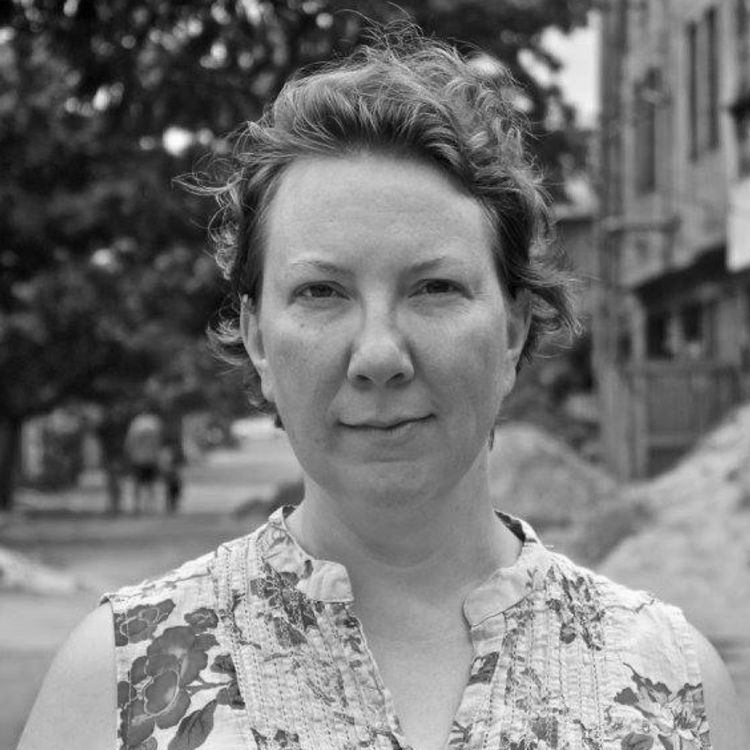
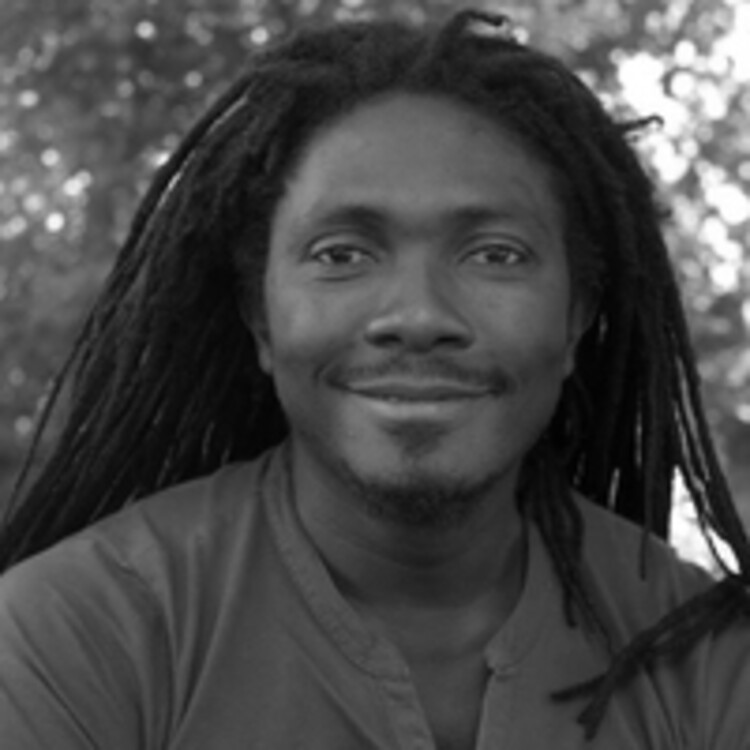
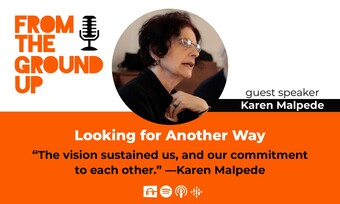


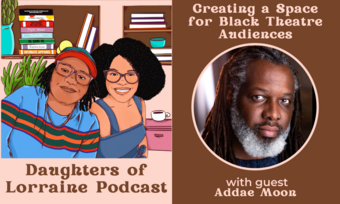



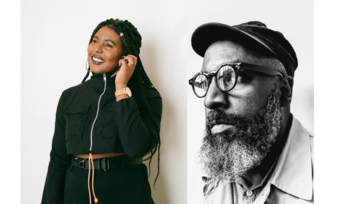


Comments
The article is just the start of the conversation—we want to know what you think about this subject, too! HowlRound is a space for knowledge-sharing, and we welcome spirited, thoughtful, and on-topic dialogue. Find our full comments policy here